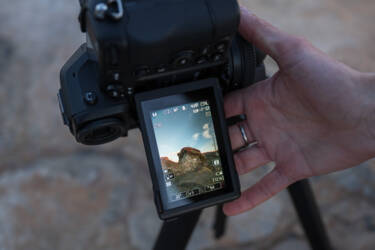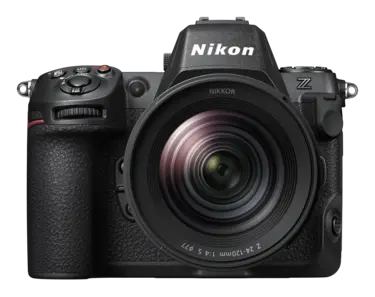How to shoot with a drone

Travel photographer and content creator Olivier Wong reveals his essential tips for elevating your drone images, the trick to shooting light painting photography and why the new Nikon Z 8 is perfect for taking vertical video
Light painting photography anyone? Olivier Wong (Wonguy on social media) has built his 4.5 million TikTok following shooting jaw-dropping vertical videos of the world’s most gorgeous sun-kissed cities. As part of Nikon’s The Movement series, Olivier took to the Tabernas desert in Spain to challenge both himself and the new Nikon Z 8 by shooting a ring of light in the sky. Read on to discover his go-to settings for drone photography and how he captured that shot.
Nikon magazine: What was your inspiration for your ring of light shot?
Olivier: I was inspired by Reuben Wu – the master of light painting photography. It was an experiment for me to try this shot as I’ve never done it before, and I wanted to see if the new camera would be able to pull it off. I thought the Tabernas desert in Spain would be the perfect place to experiment.


How did you set up the shot?
I put small cube lights on my drone, which created the source of light in the sky. I flew the drone during blue hour and rotated the drone around the rock with the light attached. On the ground, I had my Nikon Z 8 mounted on a tripod and I also used an ultra-wide-angle lens, the NIKKOR Z 14-30mm f/4, which I used because I was close to the rock. As I was doing a long exposure, I didn’t need the f/2.8 lens because I was closing down the aperture — depending on the light available at the time, it was around f/8 to f/11.
I was able to use the Z 8’s Starlight View — a new feature dedicated to night photography — which brightens up the display so you can easily check your composition and focus without affecting the final output of the image. It really is a game-changing feature, especially for this kind of shoot in the dark. The feature helped me to see the light of the drone was inside the frame as well as that the rock was well lit. The buttons are also animated in the dark, which is a great option, too.
During the shoot, there was a lot of trial and error. When you’re doing long exposure, you have to make sure the exposure and the time it takes for the drone to make a circle are exactly the same length. It was not always a perfect rotation as there was wind, so that’s why there were a few different attempts to get the final image.

On the road with Olivier Wong
Click the button to play
What are your key camera settings?
It depends on the location and time of the day I’m shooting and if the weather is clear or not. But most of the time I shoot in manual mode for both photos and videos. For photos, I like to shoot in RAW format and keep the ISO at the minimum to get the best quality. When I’m shooting video, I respect the shutter angle rule, which means, for example, if I shoot a video at 30 frames per second, I try to shoot at a shutter speed of 1/60. This gives me some nice motion blur in the final video. I also like to shoot in 10 bit N-LOG video format so I keep the details in highlights and shadows in the image, which is really helpful during the colour-grading process.
In our series, you said light and composition are the foundation of every image. How so? How do you source light?
I mostly shoot during golden hour at sunrise and sunset because I think it is the best kind of light you can get when you are capturing photos and videos. When you shoot at midday, for example, the sun flattens the image – you don’t get this 3D rendering under bright sunlight, which you do when the sun is low in the sky. Golden hour also provides beautiful shade and colours on the face, which is why I think choosing the right moment to shoot depends on the location and the location’s lighting – it can really make or break an image.
I also use The Photographer’s Ephemeris app to track the sun position and I find it useful when I travel to regions I don’t know well.


What did you think of the Z 8?
The Z 8 has the video capabilities of the Z 9 in a compact body. Nikon has a brilliant reputation for stills photography so I knew the photo feature would be good because I already have the Z 7II and I know it’s good. But I didn’t expect the Z 8 to have the whole features of the Z 9. Now, inside one camera, we have the very best of what Nikon is capable of.
The size is great because I mostly do run-and-gun shooting with the camera on a gimbal and I prefer to go lightweight, which is why I like the compact body. It has the video features of the Z 9, so I can shoot for my needs (8.3K in 60p in RAW video and 4K up to 120p), and it’s also built for vertical shooters like me! There’s a vertical playback and the four-axis tilting screen is useful for vertical shooting. It’s very convenient.
Olivier’s top 4 tips for shooting drone photography
- First, check the local regulations in case the area is protected. You need to know how high you can fly and which monuments you can fly above. Normally in cities and towns, you can’t fly, so you must check. If you need a permit, always ask beforehand.
- Check the location to see if it’s drone worthy. Sometimes locations don’t always look good from the air, so it’s always worth scouting the area and checking. I like to check Google Maps to see if there is a point of interest I can fly around.
- Shoot different angles. I like to take varied angles centred on the subject. Angles such as looking down to the subject and also bird’s-eye-view shooting, 90 degrees towards the ground, provide some good perspective.
- When shooting video, pushing and tilting the camera towards the subject can create some really cinematic shots of the location. I like to use the orbital shot, which means you turn around the subject – it’s brilliant to reveal a location or just provide a perspective of what’s surrounding the subject.
Discover The Movement
Explore more of Olivier Wong

Für noch mehr Kreativität







